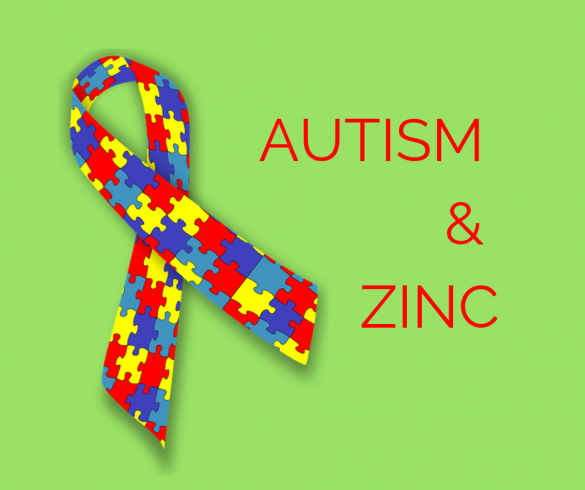AUTISM and Zinc

Did you know that 85% of children with autism are deficient in zinc?
ZINC
ZINC is important for a good immune system, digestion, and keeping neurotransmitters (hormones that affect mood, behaviour and sleep) balanced. Low zinc affects the sense of taste, so improving zinc levels can make it easier to introduce new foods, which is often difficult with autistic children.
Zinc is also important in the process of removing heavy metals from the body, and keeping copper in check. Heavy metals and excess copper which may build up as a result of low zinc will exacerbate symptoms of autism.
William J. Walsh, PhD had, by 1999, collected a database of 50,000 blood and urine results for autistic children. His findings were that children with autism have distinctive chemical (nutritional) imbalances, including:
- Zinc deficiency
- Copper overload
- Vitamin B-6 deficiency
- Elevated toxic metals (mercury, lead, and others)
- Low levels of magnesium
- Undermethylation (affects detoxification)
- Elevated urinary pyrroles
- Excessive oxidative stress
Most children with autism also experience some or many of the following: (interestingly, a zinc deficiency can underlie many of these symptoms)
Gut problems (malabsorption, food sensitivities, reflux, incomplete digestion of proteins, yeast overgrowth, constipation/diarrhoea, parasite overloads, leaky gut (incompetent intestinal barrier)
- Sleep disturbances
- Sensitivities to sound, touch, chemicals
- Poor appetite, picky eating
- Anxiety
- Frustration and emotional meltdowns
- Enuresis (involuntary urination)
- Poor immune function
It is important to realise that some of the gut problems cause pain, and pain is always going to affect both behaviour and sleep in any individual. If we can heal the gut, we can:
- Stop undigested protein from reaching the brain and causing poor behaviour
- Enable nutrients to reach the brain and support learning
- Allow food to be correctly digested and absorbed, and prevent overgrowth of harmful bacteria, which release toxic by-products and cause poor behaviour
- Reduce inflammation in the gut, which has a knock-on immune effect
GLUTEN & CASEIN (a protein found in milk)
I mention gluten and casein here as they can negatively impact anyone with compromised digestion. “A study of 500 autism cases showed that 85% of families adopting the special diet (gluten-free and casein-free) reported major benefits.”
CONCLUSION
I believe that children with autism can experience significant improvements in their health through dietary and nutritional intervention, gut repair and detoxification. These treatments will form an important foundation for other treatments, as well as the ongoing well-being of the child and family.
“Recent advances in biomedical and behavioural therapies have resulted in thousands of reports of recovery throughout the world. Most of these reports involved intervention prior to age four, but significant progress can be made at any age.” Nutrient Power by William J. Walsh, PhD
“I look forward to the time when the medical and scientific communities acknowledge that autism is treatable...” Nutrient Power by William J. Walsh, PhD
If your child has autism, I would highly recommend seeing a naturopath, and having a full assessment done.
If you would like to book an appointment, please contact me on 0431917728
or https://www.perthnaturopath.com.au/contact/
If you want to learn more about pyrrole disorder, download my free ebook “Anxious, depressed, angry, behavioural disorders? Could it be Pyrrole Disorder?”
https://perthnaturopath.com.au/e-books/pyrrole-disorder-e-book/
